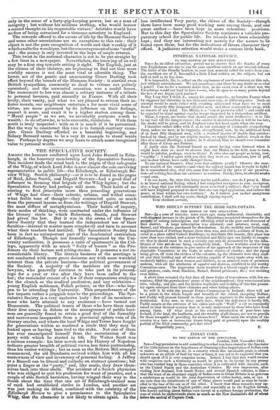THE SPECULATIVE SOCIETY.
AMONG the honours conferred upon Lord John Russell in Edin- burgh, is the honorary membership of the Speculative Society. This incident leads the mind back to the origin of that sub-genus of the Whig, of which Lord John is now almost the sole surviving representative in public life—the Edinburgh, or Edinburgh Re- view Whig. Scotch philosophy—as it is to be found in the pages of Reid, Adam Smith, am' Dug,ald Stewart—had a good deal of influence in forming that brigade of the Whig legion ; but the Speculative Society had perhaps still more. Their habit of re- curring to first principles more than preceding, generations of Whigs had done—their eclectic, urbane, and withal some- what feeble tone of thought—they contracted quite as much from the personal lessons as from the writings of Dugald Stewart, the most diffuse of metaphysicians. Their habits of inquiry, their modes of thinking, were contracted under the influence of the literary circle to which Robertson, Smith, and Stewart had given the law. But it was in the arena of the Specu- lative Society that they learned the independent use of their faculties—learned to master more completely and turn to account what their teachers had instilled. The Speculative Society has been in fact no unimportant part of the Academical curriculum of Edinburgh. Though not formally recognized by the Uni- versity authorities, it possesses a suite of apartments in the Col- lege, apparently with as much " fixity of tenure" as the Pro- fessors do their lecture and robing-rooms. It possesses a not in- considerable library. The literary business of the meetings is not conducted with more grave decorum nor with more watchful interest than the private business—the political government of the Society. A majority of the members are the young lawyers, who generally continue to take part in its proceed- ings for a year or two after they have been called to the bar; the remainder consist of a few of their companions studying for the church or the medical profession, and any celebrities— young English noblemen, Polish princes, or the like—who hap- pen to be attending the University. This preponderance of the law imparts rather a priggish tone to the proceedings. The Spe- culative Society is a very exclusive body : few of its members— none who have attained to any eminence —have turned out Democrats. The political tenets of those who have there made their first essays in debate or the management of public busi- ness are generally found to retain a good deal of the formality and narrowness inseparable from a provincial sphere vain of its literary oracles, and where the local Whigs and Tories have fought for generations within so confined a circle that they may be looked upon as having been tied to the stake. Not one of them has ever emancipated himself from the sectarianism of the party with which he started in life. Sir 'Walter Scott was a curious example : his later novels and his History of Napoleon indicate greater breadth of political views, less fierce partisanship, than his earlier writings ; but as soon as the Reform Bill struggle commenced, the old Dundasite revived within him with all his narrowness of view and inveteracy of personal feeling. A Jeffrey or a Russell can be liberal and catholic on abstract questions ; but point a finger at the "party," and, like snails, they draw them- selves back into their shells. The accident of a Scotch physician who was obliged to quit his profession for want of practice, and a couple of able Scotch barristers, having winged their way to the South about the time that one set of Edinburgh-trained men of rank had established circles in London, and another set was just making its debut, combined with the celebrity of the Edinburgh Review to give a prominence to the Speculative Whig, that the character is not likely to obtain again. In the less intellectual Tory party, the eleves of the Society—though there have been many good working men among them, and one great author—have been kept in more subordinal positions. But to this day the Speculative Society continues a valuable pre- paratory school for public life. Its records have been admirably kept ; and they are interesting not merely for the names to be found upon them, but for the indications of future character they afford. A judicious selection would make a curious little book.


























 Previous page
Previous page